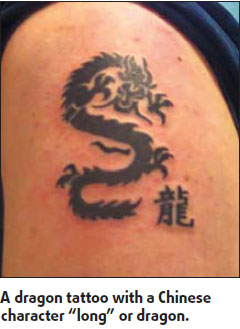 |
|
Bleeding judo athlete Craig Fallon of Britain at the Beijing 2008 Olympic Games, has a tattooed Chinese character "yong", meaning brave, on his chest. [Reuters] |
Celebrity Chinese tattoos are indelible proof of the country's growing cultural clout, but also evidence that where body art is concerned local is global.
Dragon and Mandarin character designs are ubiquitous in the West but less visible here, where a relatively conservative attitude toward tattoos still exists - they used to be the mark of criminals.
While up to 35 percent of NBA stars have some kind of Chinese-themed motif inked into their skins, the number of Chinese sports stars or entertainers with tattoos is minimal.
Since Dennis Rodman ("Ink not mink") broke the mold in the 1990s the NBA has become so tat obsessed that Yao Ming and Yi Jianlian's unblemished skins are the exception to the rule.
Being a "bad boy" can be a positive selling point in the West, where individualism and thug culture like hip-hop is as likely to be celebrated as castigated.
Marcus Camby of the LA Clippers wears his heart on his sleeve and has the Chinese characters "strive for the clan, the family" on his right arm. Allen Iverson, one of the most decorated NBA players, in terms of tats and stats, has the character for "loyalty".
The irony here is that tattoos have become a mark of collective identity, rather than unique personality.

One of the few NBA players to have lived in China, the Denver Nuggets' Chris Anderson briefly played for the Jiangsu Nangang Dragons in 2000.
He wanted the character for "good" on one arm and "bad" on the other - accurately summing up his character and performances. Unfortunately, something got lost in translation as the character for bad also means "nausea".
He's not the only one to get it wrong. Shawn Marion of the Toronto Raptors calls himself "The Matrix" and wanted to tell the world by inscribing it in Mandarin on his leg. But to Chinese it reads: "Demon bird camphor".
Pop star Justin Timberlake has the character "qu", which means "song", but also "bent, crooked or wrong".
Clearly, most Western celebrities who opt for Chinese tattoos don't know exactly what the characters represent. They want them because they are exotic, different and therefore cool.
Take the Backstreet Boys' Nick Carter, for example. Among the singer's many tats is a shark on his left bicep, accompanied by the characters "hai shen" for Poseidon. Mixing Chinese characters and Greek mythology is unique, even if it doesn't really signify anything.
Britney Spears had a flower with the character "mystery" stenciled near her navel, probably thinking that in Chinese it would be even more enigmatic. And she's got a point. To most people in her entertainment circle the characters are a mystery.
Tattoos have never been more popular. The first series of hit TV show "Prison Break" revolved around the puzzle of tats worn by actor Wentworth Miller and made him a star.
In the cult TV program, "Lost," the lead role played by Matthew Fox has a four character poem written by Mao Zedong, which translates as: "Eagles high up, cleaving the space." Fox's screen life followed art when the show's plot incorporated the tattoo, which he had inked before filming began.
Another celebrity inspired by Mao is boxer Mike Tyson, who had a picture of the leader drawn on his bicep after visiting his mausoleum in Beijing.
Since China has become more visible on the world stage its cultural products, including tattoos, have become fashionable.
The 2008 Olympic Games featured the most tattooed bunch of athletes ever assembled.
Naturally, many of them added to their collection, including British archer Laurence Godfrey, who inked a Chinese dragon to go with his Olympic Rings.
Another visitor to Beijing for the Games was David Beckham, who on an earlier trip to Hong Kong had one side of his torso etched in traditional characters, written top to bottom, with the Chinese saying: "Death and life have determined appointments. Riches and honors depend upon heaven."

Like Beckham, megastar Angelina Jolie, has a one-world approach to her collection, mixing tattoos from different cultures to create her living canvas.
In addition to the Tennessee Williams quote "A prayer for the wild at heart, kept in cages", she has "strength of will" in Arabic, "know your rights" in English and a Chinese-style dragon and tiger on her lower back.
Animals have always been popular because they represent characteristics the wearer has, or wishes to possess.
Chinese-style designs are just one among many styles of tattoos - biker, Celtic, Japanese, Maori, erotic, old school and sailor -- that can be picked to adorn the body.
Opting to have a Chinese tat may not signify anything more than people now have a world of choices.
And while celebrities appear to popularize tattoos, it could equally be argued they reflect the general public's fascination with the art form in recent decades.
Tattoos have become mainstream because they are seen as mainly decorative. Pop culture icons give them a stamp of approval.
(China Daily, March 26, 2009)